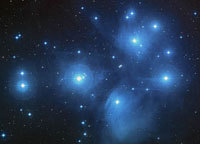Number of stars in the Universe seriously undercounted
 The night sky may be a lot starrier than we thought. A study suggests the universe could have triple the number of stars scientists previously calculated. For those of you counting at home, the new estimate is 300,000,000,000,000,000,000,000. That's 300 sextillion.
The night sky may be a lot starrier than we thought. A study suggests the universe could have triple the number of stars scientists previously calculated. For those of you counting at home, the new estimate is 300,000,000,000,000,000,000,000. That's 300 sextillion.
The study questions a key assumption that astronomers often use: that most galaxies have the same properties as our Milky Way. And that's creating a bit of a stink among astronomers who want a more orderly cosmos, according to The Associated Press.
"It's very problematic," said Pieter van Dokkum, a professor of astronomy at Yale who reported the findings in the journal Nature with Charlie Conroy of the Harvard-Smithsonian Center for Astrophysics in Cambridge, Mass.
"We may have to abandon this notion of using the Milky Way as a template for the rest of the universe," Dr. van Dokkum said. If the findings are correct, an undercount of dwarfs would mean astronomers have underestimated the masses of galaxies, and that would mean that galaxies developed earlier and faster than currently thought.
"Which would be very interesting, actually," said Richard Ellis, a professor of astronomy at the California Institute of Technology who was not involved in the research. "It's very important that papers like this are published so that we are reminded how fragile our knowledge of the universe is," according to New York Times.
Subscribe to Pravda.Ru Telegram channel, Facebook, RSS!


